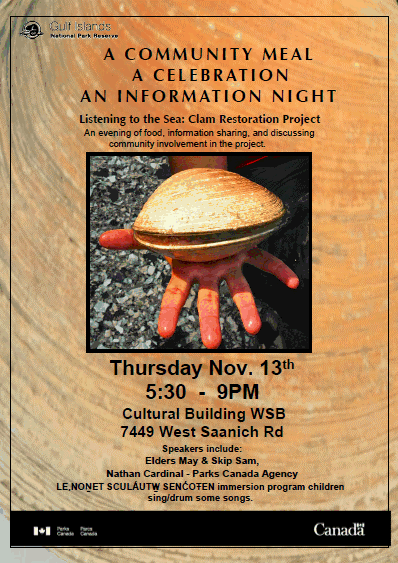One of the greatest privileges in NW Coast Archaeology is the opportunity to work with First Nations people of all walks of life and to be afforded the chance to tell a small part of their magnificent histories. How many settlers in this area don’t know a single aboriginal person? More than a few, I reckon. Yet how to get that face to face contact so essential for gaining an understanding of the historical circumstances of First Nations if, unlike me, your day job doesn’t have it somewhat built in? If you live in Victoria, you have three great options coming up – and all three include some archaeological content. Perhaps archaeology has the potential, not commonly realized, of forming a space of shared interest where conversations can start.
Following on the heels of the amazing clam garden event a couple of weeks ago there will be a second iteration of this event on Thursday November 13th – that’s tomorrow! Or even today! I see it on the Aboriginal Neighbours website discussed below so I am assuming it is open to the broader community.
There will be an event centered around community mapping on the 22nd of November, this one will include Cowichan traditional “gravedigger” and film-maker Harold Joe. Those who bear the hereditary responsibility to tend to the dead has in recent years expanded their scope to mean that many of those “gravediggers” now work alongside archaeologists to ensure proper protocols are followed to ensure the safety of all concerned. It makes so much sense when you think about it, and the experience has been transformative for more than one archaeologist I know.
Finally, there will be an event with Nick Claxton, UVic PhD candidate and reef-netter (mentioned here) on the 25th of November. This one costs $20 and requires reservation.
The community mapping event includes the involvement of an intriguing organization I hadn’t come across before: Aboriginal Neighbours. This group is spearheaded by a group of local faith groups who seek reconciliation, from a starting point of appropriate humility and frank acknowledgment of the historical excesses of the Church. That’s about all I know of them, but if they continue to sponsor events based in respect, where people can come together, learn, and talk then they’ll be contributing to greater cross-cultural understanding, which itself should inform and strengthen and perhaps mobilize allies within settler society. It’s been heartening to see the settler community of SaltSpring Island rise to protect the Grace Islet Coast Salish cemetery, for example.
Indeed, “Love your neighbour as thyself” might actually be a decent, even under-rated, place to start.

Aboriginal Neighbours Screenshot. http://aboriginalneighbours.org/






I moved to Bethel, Alaska in the 1970’s and worked with men of the local Central Yupik communities. I hunted and subsistence and commercially fished with these same men for 11 years. I left for a new home in Northern New Mexico. My wife and I split there and returned to Bethel and eventually married a young woman from the Nelson Island region of the Bering Sea Coast. Her family became my family. As expected, I again hunted and fished when living in her village. This area while rich in both fish and game of all kinds, attracted few whites from the earliest times. No gold or abundance of minerals, few beaver, whales, or salmon, a shallow coast line, and no timber meant that there was nothing to attract outsiders. Without the proper skills, this region looked like very poor country to white folks.. Caribou had disappeared in the late 1870’s and along with moose and brown and black bears would not return until the late 1990’s. Fortunately, the opposite was true for skilled families Three species of seals, walrus, beluga, water fowl, lot of small game and many species of salt water and fresh water fish are extremely abundant. Most men are extremely skilled in a a large number of methodologies for efficient capture of these same species. Traditional methods are easily combined with modern technologies.. No man without a hard working, highly skilled wife and the support of their families is considered successful. My wife expected me to watch and learn quickly so as not to bring shame to her. My own family traditions allowed me to learn the social rules quickly. My older relatives had all survived extreme famine and horrible epidemics. It was a tough and sometimes brutal life but my children never cried with hunger nor did I have bury any from measles or diphtheria. I learned that a full belly was a pleasant reward and a cup of strong coffee or tea with a spoon of sugar was a great reward. At 70, I still carve wood in the old style and am grateful for the memories of days when I hunted or fished daily. They were joyful days.
LikeLike